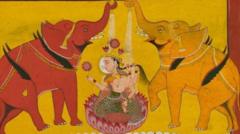Abu Abraham, renowned for his sharp political cartoons, challenged censorship during India's 1975 Emergency, reflecting on media independence issues that resonate today. His legacy intertwines humor with political commentary, showcasing the importance of satire in the face of repression.
The Legacy of Abu Abraham: India's Satirical Voice Against Censorship

The Legacy of Abu Abraham: India's Satirical Voice Against Censorship
Exploring the life and impact of Abu Abraham, an influential political cartoonist who navigated censorship in India during the Emergency and left an indelible mark on the media landscape.
**Article Text:**
"How can censorship be lifted suddenly without giving us time to prepare?" a weary editor remarks over the phone, as the satirical cartoon by Abu Abraham encapsulating this sentiment lies across his desk. Abu, hailed as one of India's preeminent political cartoonists, is known for his incisive humor and critique of power, particularly during the tumultuous Emergency period in India from 1975 to 1977, which saw an unprecedented suspension of civil liberties and media freedom under Prime Minister Indira Gandhi's regime.
The day of the Emergency, June 25, 1975, marked a grim turning point; the presses went silent as censorship laws were abruptly imposed, demanding obedience from the media. In stark opposition, Abu's cartoons became a source of resistance, exemplifying the media's role as both a commentator and a watchdog. His artwork remains relevant decades later, reflecting continuous challenges to press freedom in India, which ranks169th in the World Press Freedom Index, as reported by various international watchdogs.
While Abu drew attention to the absurdities of government overreach through his satirical lens, he managed to evade direct censorship for much of his career. Returning to India after a successful stint in London, he began with the Indian Express amidst a landscape rife with political volatility. His works struck at the heart of official narratives, including a bold cartoon portraying President Fakhruddin Ali Ahmed ceremoniously signing the Emergency declaration from a bathtub—symbolizing the nonchalant disregard for democracy.
With wit and insight, Abu's cartoons highlighted the absurdities of propaganda during the Emergency, including a poignant piece showing the forced cheerfulness of the state, asking, "Don't you think we have a lovely censor of humor?" His work often bore the mark "Not passed by censors," a bold challenge to the authorities.
Born in Kerala in 1924 as Attupurathu Mathew Abraham, Abu's career began as a reporter during India's independence struggle before he made a name for himself in the UK. His transition to cartooning saw him gain recognition as one of Britain's sharpest voices against power, including impactful contributions to established platforms like The Observer and The Guardian.
Beyond satire, Abu held a profound belief that all facets of society are inherently political. His reflections on the press considered its dual role as both a crusader for justice and a maintainer of the status quo. In a playful take on sycophancy in politics, he created a fictional account of the "All India Sycophantic Society," critiquing the era's culture of insincerity.
His return to India in the late 1960s brought with it a nuanced understanding of artistry intertwined with democracy. Utilizing humor, Abu channeled the complexities of Indian politics through an entertaining yet incisive lens, ultimately paving the way for future generations of cartoonists. His legacy extends beyond laughter; it reveals uncomfortable truths about power, repression, and the inherent absurdities in reality, carving a path for political satire that transcends mere entertainment.
Abu Abraham’s life and work serve as a reminder of the enduring significance of political commentary, especially in times of repression, showcasing how art can challenge authority and inspire dialogue. His poignant observations remind us that humor, however dark, often reflects the underlying truths of society, resonating far beyond the pages of newspapers.
"How can censorship be lifted suddenly without giving us time to prepare?" a weary editor remarks over the phone, as the satirical cartoon by Abu Abraham encapsulating this sentiment lies across his desk. Abu, hailed as one of India's preeminent political cartoonists, is known for his incisive humor and critique of power, particularly during the tumultuous Emergency period in India from 1975 to 1977, which saw an unprecedented suspension of civil liberties and media freedom under Prime Minister Indira Gandhi's regime.
The day of the Emergency, June 25, 1975, marked a grim turning point; the presses went silent as censorship laws were abruptly imposed, demanding obedience from the media. In stark opposition, Abu's cartoons became a source of resistance, exemplifying the media's role as both a commentator and a watchdog. His artwork remains relevant decades later, reflecting continuous challenges to press freedom in India, which ranks169th in the World Press Freedom Index, as reported by various international watchdogs.
While Abu drew attention to the absurdities of government overreach through his satirical lens, he managed to evade direct censorship for much of his career. Returning to India after a successful stint in London, he began with the Indian Express amidst a landscape rife with political volatility. His works struck at the heart of official narratives, including a bold cartoon portraying President Fakhruddin Ali Ahmed ceremoniously signing the Emergency declaration from a bathtub—symbolizing the nonchalant disregard for democracy.
With wit and insight, Abu's cartoons highlighted the absurdities of propaganda during the Emergency, including a poignant piece showing the forced cheerfulness of the state, asking, "Don't you think we have a lovely censor of humor?" His work often bore the mark "Not passed by censors," a bold challenge to the authorities.
Born in Kerala in 1924 as Attupurathu Mathew Abraham, Abu's career began as a reporter during India's independence struggle before he made a name for himself in the UK. His transition to cartooning saw him gain recognition as one of Britain's sharpest voices against power, including impactful contributions to established platforms like The Observer and The Guardian.
Beyond satire, Abu held a profound belief that all facets of society are inherently political. His reflections on the press considered its dual role as both a crusader for justice and a maintainer of the status quo. In a playful take on sycophancy in politics, he created a fictional account of the "All India Sycophantic Society," critiquing the era's culture of insincerity.
His return to India in the late 1960s brought with it a nuanced understanding of artistry intertwined with democracy. Utilizing humor, Abu channeled the complexities of Indian politics through an entertaining yet incisive lens, ultimately paving the way for future generations of cartoonists. His legacy extends beyond laughter; it reveals uncomfortable truths about power, repression, and the inherent absurdities in reality, carving a path for political satire that transcends mere entertainment.
Abu Abraham’s life and work serve as a reminder of the enduring significance of political commentary, especially in times of repression, showcasing how art can challenge authority and inspire dialogue. His poignant observations remind us that humor, however dark, often reflects the underlying truths of society, resonating far beyond the pages of newspapers.






















